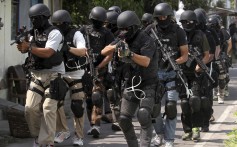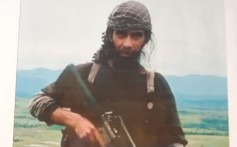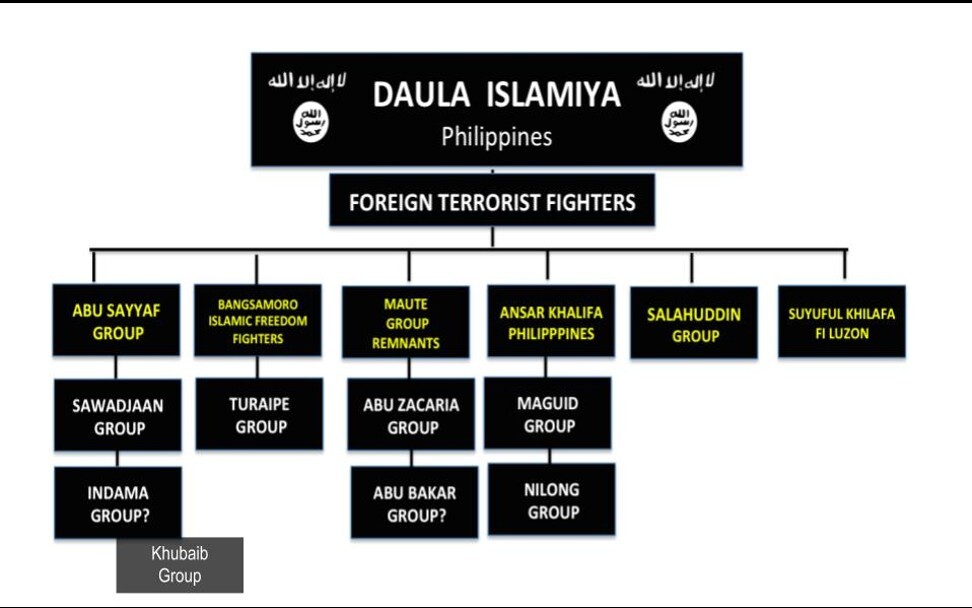Posted to This Week in Asia (Dec 12, 2020): ‘US still the target’: Indonesia’s arrest of Jemaah Islamiah terrorist leader reveals thousands of recruits (By Amy Chew)
- JI said to be in ‘damage control’ after detention of Ustad Arif but expected to be operating normally in six months to a year
- Group is now raising funds through various business activities as it seeks to establish an Islamic caliphate in Indonesia and the southern Philippines

Members of Indonesian counterterrorism task force Detachment 88 during an anti-terror exercise at the Borobodur hotel in Jakarta. The unit recently arrested the leader of IS, Ustad Arif. Photo: AFP
About two months ago, Indonesian counterterrorism task force Detachment 88 arrested a little-known cleric named Ustad Arif, according to a senior security source.
About two months ago, Indonesian counterterrorism task force Detachment 88 arrested a little-known cleric named Ustad Arif, according to a senior security source.
The 54-year-old from Klaten, Central Java, turned out to be the leader of Jemaah Islamiah (JI), the Southeast Asia branch of al-Qaeda.
JI was behind all the deadly terror attacks in Indonesia from 1998 to 2010 before it was weakened by Indonesian counterterrorism police, who arrested hundreds of its members during the period, including several leaders.
JI military leader arrested in Indonesia after 17 years on the run
12 Dec 2020


“Ustad Arif was arrested about two months ago,” a senior security source told This Week In Asia on condition of anonymity this past week before adding a tantalising detail: “He has links to Malaysia, but those links have not been profiled. They are sleeper cells.”
JI military leader arrested in Indonesia after 17 years on the run
12 Dec 2020

“Ustad Arif was arrested about two months ago,” a senior security source told This Week In Asia on condition of anonymity this past week before adding a tantalising detail: “He has links to Malaysia, but those links have not been profiled. They are sleeper cells.”
Following the JI-masterminded 2002 Bali bombings, which killed 202 people, including 11 Hong Kong residents, JI had split into two factions, said Robi Sugara, a lecturer and counterterrorism analyst at Syarif Hidayatullah Islamic University in Jakarta. One faction believed in violent jihad and supported al-Qaeda and later, Islamic State, while another believed in what Sugara called “jihad proselytisation”.
JI suffered a near extinction in 2007 when an armed clash with police in Poso, Central Sulawesi, led to the arrest of more than 40 of its members, including top leaders, according to a 2017 report by the Institute for Policy Analysis of Conflict (IPAC). From 2007, it has also been known as “neo-JI”, IPAC said.
Sugara said it was mostly members of the jihad proselytisation faction of JI that were arrested recently as “they supplied funds to terrorists”.

Umar Patek, a member of Jemaah Islamiah, during his trial in Jakarta in 2012. He was sentenced to 20 years in prison for murder and bomb-making in the 2002 Bali bombings. Photo: Reuters
“This jihad proselytisation [faction] doesn’t call itself JI any more,” Sugara said, and has instead set up schools and charity organisations to raise funds for the group.
The advent of Islamic State (Isis) in 2014 saw the rise of Isis-linked Jemaah Ansharut Daulah (JAD), which replaced JI as the main perpetrator of all major terror attacks in Indonesia since 2016. In that same year, at least eight people, including four terrorists, were killed when bombs were detonated and shooting broke out outside Sarinah department store in central Jakarta.
JI REGENERATES
The arrest of Arif revealed that JI has been regenerating and is estimated to have recruited “thousands” of members, according to the security source and analysts.
Its pattern of recruitment – through Islamic boarding schools it owns, cooperation with other militant groups, fundraising, logistical support and equipment – is very well-organised and difficult to detect, said National Police Commission head Benny Mamoto, a retired police general who investigated the Bali bombings and estimates that JI has recruited 6,000 people into its ranks.
Before his arrest, Arif had led JI for only eight months, the security source said. He was the second JI leader to be arrested within the last two years.
The source said JI would “need time to find a figure” to take over leadership of the group.
Only 60 graves left for Indonesian Covid-19 victims as cemetery in capital Jakarta fills up
“In the meantime, JI will continue to operate. It is very strong but will still need to carry out consolidation as many of their leaders have been arrested,” the source said.
Muhamad Taufiqurrohman, senior researcher at the Jakarta-based Centre for Radicalism and Deradicalisation Studies (PAKAR) agrees: “JI is still strong at the moment as it has a lot of money and members. For example, a branch of JI’s charity organisation in Tangerang [in greater Jakarta] alone is able to generate 2 billion rupiah (US$142,000) a year.”
Taufiqurrohman expects JI will lie low for now until it selects a new leader. “At this moment, JI is doing damage control from the recent arrests. It will take around six months to one year for JI to elect a new leader and to operate normally,” he said.
Indonesian police have arrested more than 30 JI members this year, including Arif and JI’s expert bomb-maker Upik Lawanga, who was detained two weeks ago. Lawanga had been on the country’s most-wanted list for 14 years
According to Taufiqurrohman, JI members have decided “not to avenge the arrest of their fellow members for now” because they believe retaliation against the police would only damage their organisation even more as it would “anger the police and cause further crackdowns”.
Indonesia on alert after Isis-linked group beheads farmer to ‘sow terror’
1 Dec 2020
“This jihad proselytisation [faction] doesn’t call itself JI any more,” Sugara said, and has instead set up schools and charity organisations to raise funds for the group.
The advent of Islamic State (Isis) in 2014 saw the rise of Isis-linked Jemaah Ansharut Daulah (JAD), which replaced JI as the main perpetrator of all major terror attacks in Indonesia since 2016. In that same year, at least eight people, including four terrorists, were killed when bombs were detonated and shooting broke out outside Sarinah department store in central Jakarta.
JI REGENERATES
The arrest of Arif revealed that JI has been regenerating and is estimated to have recruited “thousands” of members, according to the security source and analysts.
Its pattern of recruitment – through Islamic boarding schools it owns, cooperation with other militant groups, fundraising, logistical support and equipment – is very well-organised and difficult to detect, said National Police Commission head Benny Mamoto, a retired police general who investigated the Bali bombings and estimates that JI has recruited 6,000 people into its ranks.
Before his arrest, Arif had led JI for only eight months, the security source said. He was the second JI leader to be arrested within the last two years.
The source said JI would “need time to find a figure” to take over leadership of the group.
Only 60 graves left for Indonesian Covid-19 victims as cemetery in capital Jakarta fills up
“In the meantime, JI will continue to operate. It is very strong but will still need to carry out consolidation as many of their leaders have been arrested,” the source said.
Muhamad Taufiqurrohman, senior researcher at the Jakarta-based Centre for Radicalism and Deradicalisation Studies (PAKAR) agrees: “JI is still strong at the moment as it has a lot of money and members. For example, a branch of JI’s charity organisation in Tangerang [in greater Jakarta] alone is able to generate 2 billion rupiah (US$142,000) a year.”
Taufiqurrohman expects JI will lie low for now until it selects a new leader. “At this moment, JI is doing damage control from the recent arrests. It will take around six months to one year for JI to elect a new leader and to operate normally,” he said.
Indonesian police have arrested more than 30 JI members this year, including Arif and JI’s expert bomb-maker Upik Lawanga, who was detained two weeks ago. Lawanga had been on the country’s most-wanted list for 14 years
According to Taufiqurrohman, JI members have decided “not to avenge the arrest of their fellow members for now” because they believe retaliation against the police would only damage their organisation even more as it would “anger the police and cause further crackdowns”.
Indonesia on alert after Isis-linked group beheads farmer to ‘sow terror’
1 Dec 2020

For the last 10 years, JI has flown under the radar as it has transformed itself from a militant group that lived off robberies and donations for its terror activities to a business enterprise with interests in palm oil plantations and the mining industry. The security source said Detachment 88 – the counterterrorism force – has continued to monitor and carry out operations against JI for the past several years, despite its lower profile.
Arif’s predecessor, Para Wijayanto, was arrested in July last year and sentenced by a court to seven years’ imprisonment this year on terrorism charges as well as for sending JI members to Syria to fight alongside opposition rebels there.
Following Wijayanto’s arrest, police discovered he had restructured and rebuilt JI into a well-run organisation with business interests in palm oil plantations, the mining industry and other commercial sectors.
“The sources of their funding came from legitimate business interests in palm oil plantations and mines in Kalimantan as well as donations and others,” said Mamoto, the National Police Commission head, adding that many of the palm oil plantations and mines in Kalimantan have since been confiscated.
The military wing is part of JI’s preparations to wage jihad in [foreign] conflict zones and in Indonesia in the event future chaos or communal conflict takes placeMuhamad Taufiqurrohman, Centre for Radicalism and Deradicalisation Studies
Taufiqurrohman said that JI’s palm oil plantations are estimated to be worth “billions of rupiah” – perhaps as much as a few million US dollars. JI is also involved in courier services, religious boarding schools on Java island, herbal medicines and fitness centres, although the fitness centres have now been closed.
JI members are also required to donate 5 to 10 per cent of their earnings every month to the organisation, he said.
Neo-JI has established units of its military wing, known as Asykari, throughout Java island and also in Lampung province in Sumatra. Despite the loss of JI’s leadership, these units still exist, Taufiqurrohman said.
“The military wing is part of JI’s preparations to wage jihad in [foreign] conflict zones and in Indonesia in the event future chaos or communal conflict takes place like what had happened in Ambon and Poso,” said Taufiqurrohman, referring to the sectarian violence that occurred in Ambon on the Maluku Islands and Poso in Central Sulawesi in 1999, killing thousands.

An Indonesian anti-terror policeman helps a wounded foreigner after a bomb blast in front of the Sarinah department store in Jakarta in January 2016. Photo: ETA
JI’s intelligence arm conducts paramilitary training at its training centres, which are called Sasana. Every JI member who passes Sasana’s training course will be sent to Syria to receive further training from al-Qaeda-linked groups like Jabhat Al-Nusra, Taufiqurrohman said.
At least 62 JI members have gone to
Syria, with 50 returning to Indonesia, six remaining and six were killed in action.
LONG-TERM TERROR THREAT
The security source said that JI has no plans for terror attacks in the immediate to short-term – part of what he said was its “long-term” strategy. When it does resume activities, the US is at the top of its strike list, he said.
JI’s intelligence arm conducts paramilitary training at its training centres, which are called Sasana. Every JI member who passes Sasana’s training course will be sent to Syria to receive further training from al-Qaeda-linked groups like Jabhat Al-Nusra, Taufiqurrohman said.
At least 62 JI members have gone to
Syria, with 50 returning to Indonesia, six remaining and six were killed in action.
LONG-TERM TERROR THREAT
The security source said that JI has no plans for terror attacks in the immediate to short-term – part of what he said was its “long-term” strategy. When it does resume activities, the US is at the top of its strike list, he said.
“JI’s main target remains the US and its allies due to its involvement in the Middle East, according to some of the recent JI documents that we found,” the source said, adding that one of the factors behind JI’s targeting the US was President Donald Trump’s support for Jerusalem to be the capital of Israel, which is a holy city for both Muslims and Jewish people.
JI has also been making moves to court various political parties in Indonesia and the Philippines as part of its strategy to achieve an Islamic caliphate encompassing Indonesia and Mindanao island in southern Philippines. Mindanao is home to several militant groups, including the notorious Abu Sayyaf group, which is known for beheading its kidnapped hostages.
“The marriage of terror groups with intolerant groups as well as political groups could result in a Syria,” said the security source.
Taufiqurrohman views JI as a threat in the medium to long term, as it still wants to wage jihad against parties it considers “enemies of Islam”.
Indonesian soap star takes on firebrand cleric for flouting Covid-19 rules
21 Nov 2020

Both the security source and Taufiqurrohman said JI is far more dangerous than the Isis-linked JAD because it has far greater financial resources, is better organised, and has better-educated and better-trained members than JAD.
Ahmad El-Muhammady, a counterterrorism analyst and lecturer at International Islamic University Malaysia (IIUM), said, however, that there was no indication of JI’s reactivation in
Malaysia. JI in Malaysia and Singapore had previously used the countries as bases for fundraising for the group.
“Monitoring continues as usual by the police to detect any kind of activities” in the country, he said, adding that he was not aware of any funding activities by JI in Malaysia.
Professor Kumar Ramakrishna, associate dean and head of the International Centre for Political Violence and Terrorism Research at Nanyang Technological University (NTU) in Singapore, said there have not been any signs that JI has re-emerged in either Malaysia or Singapore.
“The bigger threat has been Isis in terms of online radicalisation in recent years,” Kumar said.

A chart of suspected terrorist cells in the southern Philippines. Graphic: Rommel Banlaoi, Philippine Institute for Peace, Violence and Terrorism Research
Regionally, the continuing slow pace of economic reconstruction of Marawi in the southern Philippines – exacerbated by the Covid-19 pandemic – would “only fuel the extremist Islamist ideology” that sustain the militant group Abu Sayyaf and similar pro-Isis groups there, he said. The reconstruction of Marawi, after it was destroyed when it was taken over by pro-Isis groups for five months in 2017, has been moving slowly.
“We do know that the pro-Isis threat groups in the southern Philippines also have links with pro-Isis threat groups in Indonesia, so there is the potential … [for] its transnationalisation, thus threatening the wider Southeast Asian region,” said Kumar
In the Philippines, the biggest threat would come from suicide bombings, which is a fairly recent phenomenon, said Rommel Banlaoi, chairman of the Philippine Institute for Peace, Violence and Terrorism Research.
“The biggest terror threat continues to emanate from pro-Isis groups, particularly the Abu Sayyaf Group, because of their intention to mount more suicide terrorist attacks in the island provinces of Sulu, Basilan, and Tawi-Tawi,” Banloai said.
Regionally, the continuing slow pace of economic reconstruction of Marawi in the southern Philippines – exacerbated by the Covid-19 pandemic – would “only fuel the extremist Islamist ideology” that sustain the militant group Abu Sayyaf and similar pro-Isis groups there, he said. The reconstruction of Marawi, after it was destroyed when it was taken over by pro-Isis groups for five months in 2017, has been moving slowly.
“We do know that the pro-Isis threat groups in the southern Philippines also have links with pro-Isis threat groups in Indonesia, so there is the potential … [for] its transnationalisation, thus threatening the wider Southeast Asian region,” said Kumar
In the Philippines, the biggest threat would come from suicide bombings, which is a fairly recent phenomenon, said Rommel Banlaoi, chairman of the Philippine Institute for Peace, Violence and Terrorism Research.
“The biggest terror threat continues to emanate from pro-Isis groups, particularly the Abu Sayyaf Group, because of their intention to mount more suicide terrorist attacks in the island provinces of Sulu, Basilan, and Tawi-Tawi,” Banloai said.
https://www.scmp.com/week-asia/politics/article/3113648/us-still-target-indonesias-arrest-jemaah-islamiah-terrorist

No comments:
Post a Comment
Note: Only a member of this blog may post a comment.